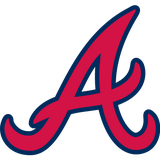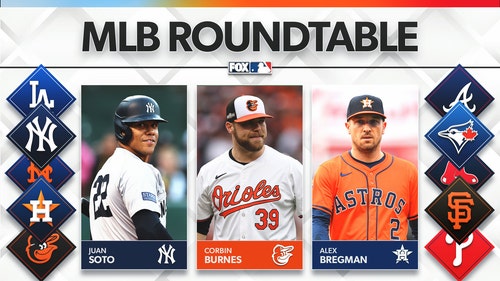
Braves Need 2016 Freddie Freeman Again, Will They Get It?
Sep 23, 2016; Miami, FL, USA; Atlanta Braves first baseman Freddie Freeman (5) celebrates with teammates after scoring a run during the sixth inning against the Miami Marlins at Marlins Park. Mandatory Credit: Steve Mitchell-USA TODAY Sports
The Atlanta Braves could have been a lot worse in 2016, but Freddie Freeman almost single handedly put a stop to that by transforming into an elite hitter. Can he repeat this performance?
While the Braves have headed off on an October vacation, the MLB playoffs are off to an exciting bang. The home stretch for baseball has begun. Soon someone will be crowned champions, and free agency and the Hot Stove season will have begun.
But wedged in between those two somewhere is awards season; the annual debate club of Twitter wondering who will get snubbed for a Gold Glove by an inferior defender with a better bat (looking at you, Brandon Crawford), does a reliever deserve a Cy Young, and how do we justify not voting for Mike Trout this time?
But somewhere lost in those heated debates will likely be Freddie Freeman’s candidacy for the National League MVP award. Because he plays for the Braves, a bottom 5 team in the major leagues. But Freeman has arguably had the best offensive season by a Brave since Andruw Jones‘ 50 home run campaign back in 2005.
No, he won’t win. And I don’t think he should. Kris Bryant deserves that honor, and really you couldn’t go wrong with any order of Daniel Murphy, Corey Seager, and Freddie to follow. But this isn’t an argument for Freddie MVP voting placement, or any variation of that argument. This is all about Freddie and what it means for his future performance.
Sep 30, 2016; Atlanta, GA, USA; Atlanta Braves first baseman Freddie Freeman (5) dives for a foul ball in the crowd against the Detroit Tigers in the fifth inning at Turner Field. Mandatory Credit: Brett Davis-USA TODAY Sports
As many know, Freddie Freeman had a career year in basically every facet. Let’s breakdown the simpler, baseball card statistics and then the sabermetrics.
Freddie’s 2016 Numbers Ranked for His Career:
AVG – .302 – 2nd (2013 – .319)
OBP – .400 – 1st
OPS – .968 – 1st
H – 178 – 1st
R – 102 – 1st
RBI – 91 – 3rd (2013 – 109)
2B – 43 – T-1st (2013)
3B – 6 – 1st
HR – 34 – 1st
SB – 6 – 1st
BB – 89 – 2nd (2014 – 90)
K – 171 – 1st
And for what it’s worth, Freddie also had the most hit by pitches of his career (10), and the most intentional walks of his career (18), to aid his fantastic walk rate and on base percentage.
These numbers are staggering, and even contradict some classic baseball rhetoric that some still cling too.
Another fun fact about Freddie’s season is a place in Braves history, as only two other players in franchise history have hit 40+ doubles with 30+ home runs in a single season. Some know them as Larry and Henry, and their numbers were hung from the Turner Field rafters.
And for the nerdier stats:
Freddie’s 2016 Numbers Ranked for His Career:
fWAR – 6.1 – 1st
wRC+ – 152 – 1st
BABIP – .370 – 2nd (2013 – .371)
ISO – .267 – 1st
Hard Hit % – 43.5% – 1st
To supplement these stats, Freddie also hit the most fly balls of his career (kind of obvious), dropped his ground ball output to a career low, and also hit the ball the opposite way more than he ever has, especially recently.
Sep 17, 2016; Atlanta, GA, USA; Atlanta Braves left fielder Matt Kemp (27) smiles before a game against the Washington Nationals at Turner Field. Mandatory Credit: Brett Davis-USA TODAY Sports
Looking at these stats, the one that really jumps off the page is an insane .370 BABIP that also tends to lead to a narrative of instability. Braves fans know this all too well, after Chris Johnson hit an unreal .394 on balls in play that almost led to a batting title back in 2013. But just because Chris Johnson is actually a bad hitter (just look at his numbers since that season; man, am I glad the Braves are out of that contract) doesn’t mean that much for Freddie.
But just what is that caliber? I’ve laid out why objectively this is Freddie’s best season to date, and I hope no one tries to dispute that. But is this performance sustainable? That is the $135M dollar question.
There are some reasonable arguments to be made that this might be Freddie Freeman adopting a new approach at the plate that just happens to coincide with Freddie beginning to approach his prime, which is typically regarded as starting around 27-28 years old. Fangraphs covered this back in June, just as Freddie was beginning to really start making baseballs cry again.
There were also reasonable arguments to be made about Chris Johnson after 2013. After all, he was hitting the ball roughly as hard as he ever had, but he was hitting more line drives and less fly balls, and he was beginning to show consistency in driving the ball more evenly across the field. But Freddie is a bit more complicated than that (and obviously more talented).
Strikeouts – The Main Culprit of Doubt
Since his rookie season, it’s been obvious that Freddie was a 20 homer power threat. The lowest amount of extra base hits he’s ever hit in a season where he qualified for the batting title was 52, also the last time he received serious MVP votes, coming in 5th that year. He’s no Mark Trumbo or Jose Bautista in terms of raw power, but he does have a tendency to hit balls really high in the air, especially to the opposite field. That’s good news, especially when you notice that Freddie posted his lowest rates of contact both in zone (Z-Contact %) and outside of it (O-Contact %) for his entire career.
But maybe that can be attributed to a mental state, with him being more aggressive than normal, as he spent a majority of the season as the lone above average offensive threat in the lineup. There was also the injury factor, as Freddie was still trying to prove the health of his wrist following injury shortened 2015 and an offseason narrative of how complicated the recovery was. Interestingly, two of his three best months (June, August, September/October) featured his highest strikeout rate (June, 27.86%) and his lowest (August, 21.77%). It’s notable that his strikeout rate returned to 24.36% in Sept/Oct, but it seems that the addition of Matt Kemp might have taken some mental pressure off of Freddie. After all, that August rate is right in line with his career average of a 21.5% rate, which was 20.76% entering 2016.
The Bottom Line?
Freddie just flat out didn’t make as much contact on his swings as he normally does. It wasn’t even particularly close. But when he did hit the ball, he hit it harder and deeper than ever. Granted, the man still hit over .300, making us scratch our heads at just how weird his season was. Fantastic, but weird.
Sep 27, 2016; Atlanta, GA, USA; Atlanta Braves shortstop Dansby Swanson (2) reacts after striking out in the eighth inning against the Philadelphia Phillies at Turner Field. The Braves won 7-6. Mandatory Credit: Jason Getz-USA TODAY Sports
I’ve had some nerdy fun with the numbers, but the truth is, they do not tell a complete story.
Or rather, one that makes total sense.
Viewed through one lens, you can attempt to write it off as a fluke year with expected regression back to the good, but not elite numbers Freeman put up from 2011 to 2015. Freeman isn’t Trout, after all.
Through the other, you can attribute his success to maturing/entering his physical prime, or even a different approach, and genuinely believe that Freddie Freeman is truly a top 5 offensive contributor in the game. Neither seem completely wrong to me, but neither seem to be right either.
Logically, it doesn’t seem likely for Freeman to continue hitting as well as he did while continuing his significant drop in contact that happened this season. It also isn’t logical to expect Freddie to continue not making his usual amount of contact, as he had the previous 5 seasons.
I believe that the answer ultimately lies somewhere in the middle, even if it is kind of a cop out answer. Nothing about Freddie’s past leads me to believe that he will be able to reproduce a season with over 80 extra base hits. Chipper Jones did it exactly once, in his 1999 MVP season. Hank Aaron himself only did it twice. But with a legitimate power threat in Matt Kemp hitting behind him for a full season, and a significant amount of plate appearances from Dansby Swason could take some of the pressure that Freeman likely imposed on himself in the early going.
I think going forward for Freddie, you can expect a mixture of the old and the new. He’s probably going to flirt with hitting .300 again. He’ll likely toe the 30 home run line a couple of more times. He will still be an on base machine while likely striking out 140 times a year. Curb your expectations folks, but make no mistake: Freddie Freeman has proven himself to be better than what we though he was, and that’s just fine for me.
More from Tomahawk Take
This article originally appeared on





